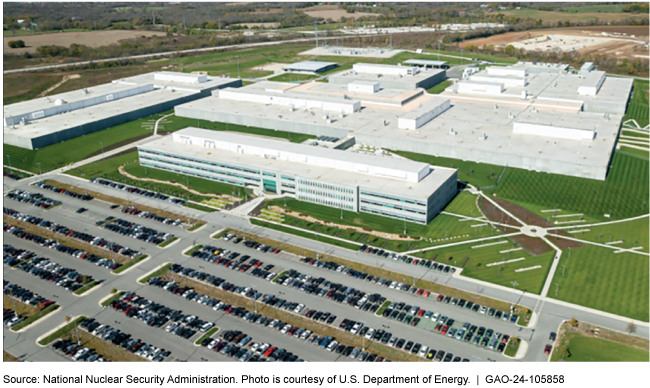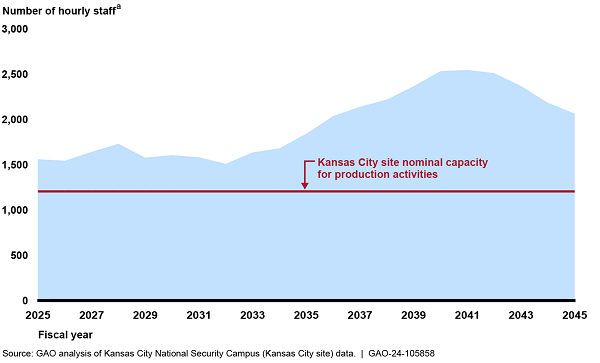National Nuclear Security Administration: Update on Actions to Manage Production Challenges at the Kansas City Site
Fast Facts
U.S. nuclear weapons contain over 80% non-nuclear parts. These parts are purchased by or produced at the National Nuclear Security Administration's site in Kansas City, Missouri. This Q&A report updates information on management challenges at the site that we first reported on in 2019.
Workload demands for the site may continue to increase over the next two decades, exceeding its capacity. NNSA has begun efforts to address this, including buying more equipment and planning an expansion of its campus.
These efforts may not fully meet future needs and the site may need additional space beyond the planned expansions to meet projected demands.
NNSA’s National Security Campus in Kansas City, Missouri

Highlights
What GAO Found
Nonnuclear parts and components make up over 80 percent of the items in a nuclear weapon. The Kansas City National Security Campus (Kansas City site) in Missouri—managed and operated by a contractor—procures or produces most of these parts under the oversight of the National Nuclear Security Administration (NNSA).
The Kansas City site's current workload demands exceed the site's nominal capacity and may continue to increase over the next two decades, based on NNSA's current program requirements and projections.
Kansas City Site Planning Scenario Showing Number of Forecasted Hourly Production Staff to Work on NNSA Weapons Systems and Other Activities, 2025—2045

aHourly staff refers to the number of hourly full-time equivalents, which reflect the total number of regular straight-time hours (i.e., excluding overtime or holiday hours) worked by employees divided by the number of compensable hours applicable to each fiscal year.
The Kansas City site has taken actions—such as acquiring additional space near its current location and making plans for further expansion—to address the need for additional production and office space created by its workload demands, and the site has also taken actions to address challenges related to its workforce, equipment, external suppliers, and quality assurance practices, resulting in some efficiency gains to the site's operations. However, the site may still face challenges in the following areas: obtaining a sufficient amount of production and office space, ensuring a sufficient contractor workforce, and maintaining a sufficient number of external suppliers.
Why GAO Did This Study
In 2019, we reported on management challenges in meeting the forecasted workload at the Kansas City site for known future production requirements. These management challenges included ensuring that the site had (1) sufficient production and administrative office space, (2) a sufficient workforce, (3) up-to-date production equipment, and (4) capable and reliable external suppliers. We also reported on the actions and strategies identified by contractor representatives and NNSA officials at the time to mitigate the effects of each of these management challenges.
A Senate committee report accompanying a bill for the National Defense Authorization Act for Fiscal Year 2022 includes a provision for us to reevaluate the progress of the NNSA and the Kansas City site toward addressing identified risks in production and office space, employee hiring, equipment, external suppliers, and quality assurance practices. This report presents information on each of these issues.
GAO reviewed and analyzed relevant documentation and data related to space, personnel, equipment, external suppliers, and quality assurance from the site contractors and NNSA.
For more information, contact Allison Bawden at (202) 512-3841 or BawdenA@gao.gov.
